What kind of experience is it when a company is "too poor with only money left"?
De La Rue, a British company with more than 200 years of history, known as "the world's first banknote printing plant", is facing the dilemma of "having a banknote printing machine at home, but waiting for bankruptcy."
The decline of this "100-year-old shop" has aroused the attention of global public opinion. Why do companies that print money have no money? What causes this money printing plant in more than 140 countries to be unsustainable? In the future, do we still need a banknote printing plant?
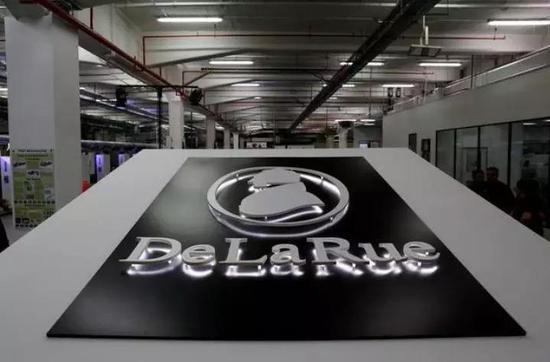
1
Banknotes stacked higher than Everest
According to the official website of Delaru, in 1813, the 20-year-old British businessman Thomas Delaru created Delaru. At that time, all the company's assets were only one printer, and its business was mainly printing newspapers and playing cards.
Since 1860, Delaru has ushered in "transformation". This company, which has printed stamps for the British government for many years, began printing banknotes for the Bank of England. With a history of more than 200 years, Delaru has started the banknote printing business for nearly 160 years.
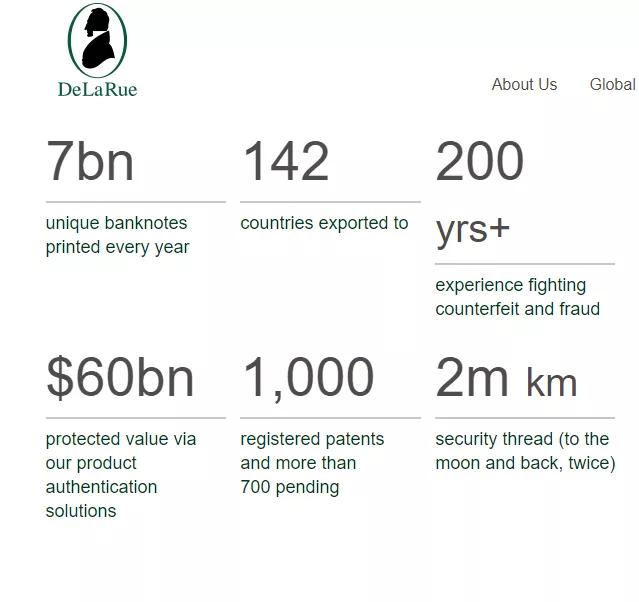
The hundred-year-long overseas colonization of the United Kingdom and the subsequent globalization pattern have brought vast market opportunities for the company. In 2008, Delaru Corporation acquired the famous stamp printing factory, the British Waldorf Company, and became the world's largest commercial banknote printing company.
According to Delaru Company, as of the end of last year, the company provided various services including printing money and making passports to 142 countries around the world. In addition to Europe, the "local tyrants" countries such as the UAE and Saudi Arabia are delaru's money printing customers.
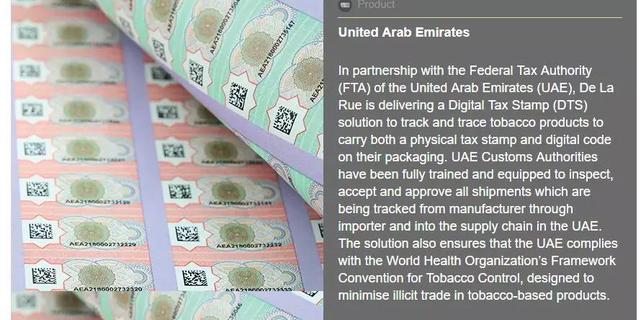
People often use "monetization ability comparable to money printing machine" to describe a company with strong profitability. So, as the world ’s largest money printing company, how strong is De Laru ’s ability to print money?
According to the BBC report, the bills printed by Delaru each week are stacked together with a cumulative height of more than 18,000 meters. These bills are more than twice the height of Mount Everest.
According to a report by the global research agency Edison, 36% of the paper currency currently circulating in the world is designed or printed by Delaru. Passports from more than 40 countries are printed by them.
In addition, Delaru has also had a lot of business dealings with China. As early as 1931, Delaru had printed some banknotes for the then government of the Republic of China.
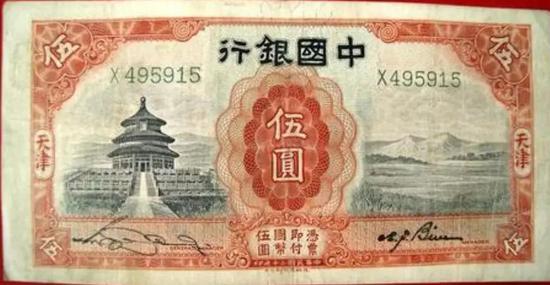
Before the return of Hong Kong, Delaru also printed Hong Kong dollars for Standard Chartered Bank and HSBC. According to the information on the Hong Kong Banknote Printing Official Website, in 1996, the Hong Kong government purchased the delaru banknote printing plant in Tai Po, Hong Kong, and officially took over the operation of Hong Kong banknote printing.
2
A century-old shop that is "too poor with only money"?
Running water bills, iron printing plant. Sitting on the title of the world's No. 1 banknote printing plant and guarding the accumulated cash higher than Everest, this high-profile "century shop" now faces a "bankruptcy warning".
On November 26 local time, the London-listed Delaru Company announced that in order to deal with the debt problem, the board of directors decided to suspend the payment of dividends. According to Delaru's annual report, as of the first half of this year, the company's net loss reached 9.2 million pounds, compared with the same period last year, net profit plummeted 87.2%.
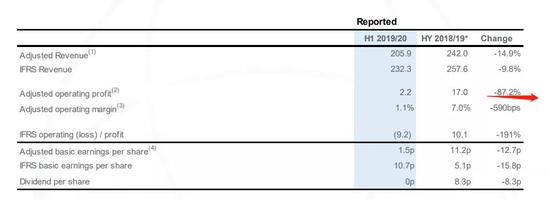
The news immediately triggered an uproar in the capital market. Draru CEO Vachel said publicly when accepting the media that the company currently needs to "rescue". In his view, Delaru was still "saved." But if the plan fails, the company may face bankruptcy. This will mean that more than 2,500 employees of Delaru, including him, are at risk of unemployment.
"There is no doubt that Delaru's financial situation is very bad." Last week local time, National Broadcasting Corporation NBC quoted the famous investment agency AJ Bell as saying, "We are full of doubts about the future of Delaru."
How bad is the once "iron rice bowl" situation? As of the close of December 20 local time, Delaru closed at 131 pounds (about 1192 yuan), and its share price has fallen 68% in the past year. It should be known that Deraru ’s stock price was once as high as 1597.4 pounds (about 14771 yuan), which is more than 10 times the A-share "share king" Guizhou Moutai.
On the other hand, the printed de la Lue is really "lack of money". Currently, the market capitalization of Deraru is 133 million pounds. However, as of the third quarter of this year, Deraru ’s net debt has reached 170.7 million pounds. If certain measures are not taken, Delaru, who is already "insolvent", will eventually slide into the abyss of "bankruptcy."
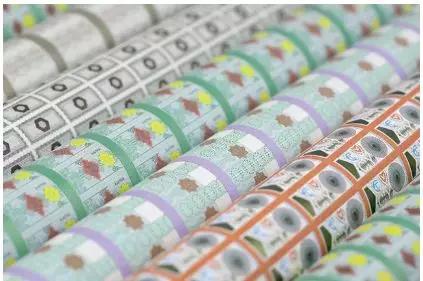
3
Will Brexit not save the "British Banknote Printing Machine"?
On the afternoon of December 20, local time, the British House of Commons voted twice on the "Brexit" "Exit Agreement Act." Eventually the bill passed smoothly and was submitted to the upper house of parliament. If the vote is passed, according to the relevant plan, the British government will complete Brexit by January 31.
For Delaru, Brexit is a good medicine for their "self-help". Because after Brexit, more than 66 million passports of British citizens will be re-created. Previously, De Laru had won a 10-year contract for the production of British passports. As a local British company, this order can be described as "aspire to get" for Delaru.
However, it was thought that it was a strong needle, but unfortunately it became a "stalk of straw" that crushed Delaru. Yesterday (December 21), according to CCTV Financial Reports, the British government has made it clear that Gemalto, which has a background in French state-owned assets, will be responsible for producing the UK passport after Brexit. Delaru, who has fallen apart, will lose more than £ 400 million in orders.
This is far more than the trouble that De Laru has to face. "Politics" is also a problem that De Laru can't get around.
Due to Venezuela ’s hyperinflation and the sanctions of the United States, as a major customer of Delaru, at present, the Venezuelan central bank is unable to pay the relevant printing costs. All that was left to De Laru was a $ 24 million receivable bill-a bill that Venezuela couldn't give, and De Laru couldn't get it.
In addition, in July this year, the British financial crime investigation agency also conducted an investigation into the suspected corruption of the South Sudanese government by Deraru. Dongfang.com News reporter found that Dararu still presents South Sudan as his typical case.
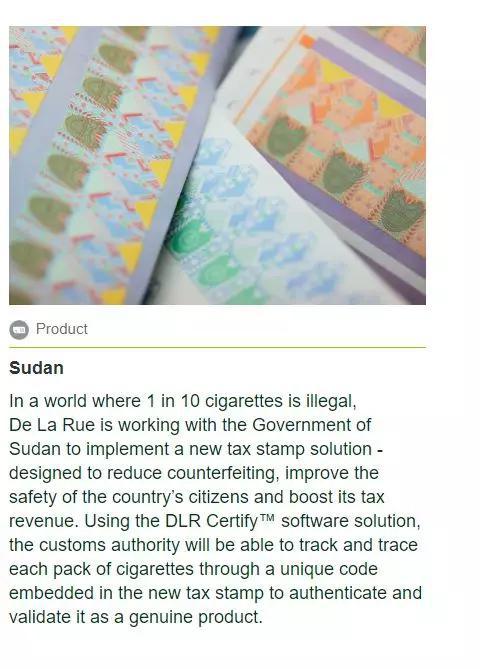
4
Ma Yun "predicted" Delaru today?
A series of "black swans" is one of the factors that caused Delaru's current situation. The change of the times may be the root of De Laru ’s dilemma.
According to Delaru ’s financial report, in the first half of 2019, Delaure ’s core “monetary business†revenue fell by nearly 30%. "Major changes in the currency market, reduced demand and price pressures have had a major impact on our business." Vachel said in an interview with the media.
Draru, who has printed banknotes for nearly 160 years, now faces the current situation where people are gradually using less or no cash. Reuters quoted British bank data showing that last year, the amount of cash payments in the UK fell by 16%. After 10 years, perhaps less than one-tenth of the transaction will be completed by banknotes and coins.
How long have you not paid in cash? In China, the impact of online payment on cash payment is even more obvious. According to data released by the People's Bank of China, in the first quarter of this year, China's banking financial institutions handled 66.554 billion non-cash payment transactions, an increase of 46% year-on-year. Mobile payments have increased substantially, and the number of payments has increased by 79.6% year-on-year.

And some countries are even ready to start the "cashless era." According to CCTV News, from 2017, the Danish Central Bank began to close all money printing institutions in Denmark. No longer printing and making Danish kroner cash such as banknotes and coins, and plans to abolish the law that stores must accept cash, so that mobile payments will gradually replace cash.
In 2017, Ma Yun, the founder of Alibaba, once said that with five years to push China into a cashless society, the future of the world will usher in a cashless era.
Whether the "cashless society" will come still needs to wait, but there is no doubt that online payment has really impacted the traditional "money printing machine" including Delaru. More than Deraru, the world's largest manufacturer of banknote printing machines, Koenig & Bauer, has chosen to go to the canning market-printing cans for beer, cola and other products.
5
Cashless is good, but cash payment is not "dead"
Of course, like the fate of paper money, De Laru encountered a dilemma, but did not officially go bankrupt. Online payment is enough to crack down on the traditional banknote printing plant, but it will not be completely destroyed. There is still some room for the "self-salvation" of the de Laru.
According to industry expert Smithers Pira, global demand for paper money is still growing. It is estimated that the average annual growth rate of the global market is 3.2%.
On the other hand, it is worth noting that although cash has suffered a certain impact, in China, the habit of cash payment can not be ignored.
On July 13 last year, the People ’s Bank of China issued a notice that the widespread use of non-cash payments has brought positive and far-reaching effects on China ’s economic and social development. However, China ’s vast territory, large population, large geographical differences, and uneven urban and rural development Consumers' payment needs are diverse, and cash payments are still widespread.
The central bank emphasized that the legal currency of the People ’s Republic of China is the renminbi, including paper money and coins. No unit or individual may refuse cash in the form of formal terms, notices, statements, notices, etc., except in cases where non-cash payment instruments should be used according to law. In addition, when promoting non-cash payment instruments, no unit or individual should speculate on the concept of "cashless".
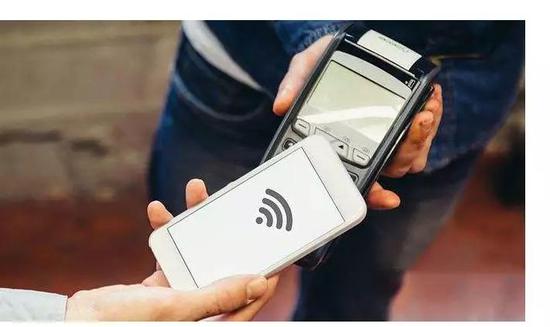
Kitchen Sink Faucets,Touch Kitchen Faucet,Retractable Kitchen Faucet,Black Steel Hose Faucet
Yuyao Zelin Sanitary Ware Co., Ltd , https://www.kitchen-sinkfaucet.com
